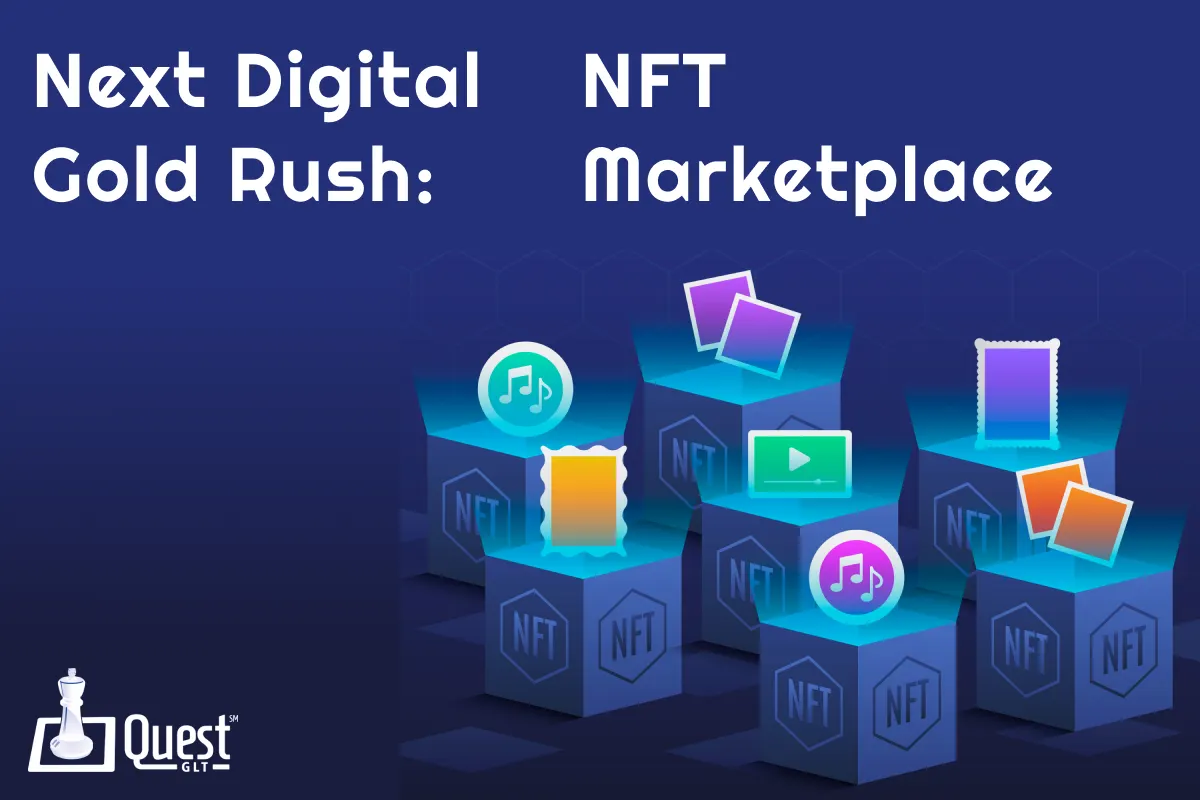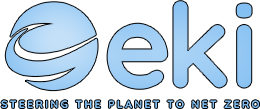
NFTs, non-fungible tokens, are digital assets such as art, music, videos, or other digital files, that establish the authenticity of an object or portion of material that appears to be rare or unique.
NFT markets are websites where creators can mint NFTs and sell them, consumers can buy and hold them, and vendors can exchange NFTs. These marketplaces have been on the rise in the last couple of years because of some widely publicized auctions and sales, for instance, the $69 million sale of digital artwork.
Building a blockchain-based non-fungible token (NFT) marketplace can be a difficult and complex process as it requires expertise in smart contracts, blockchain technology, security, and user experience design.
The NFT market provides space for artists, consumers, and merchants to exchange and earn value from their digital art. Yet, these online marketplaces provide companies with many issues, including scalability, customer adoption, legal compliance, and technological complexity to mention a few.
In this blog post, we will focus on NFT marketplace development services, the pluses and next-gen challenges which are faced by sellers, buyers, and producers. In addition, we'll investigate the challenges companies encounter when building these markets and the best practices for overcoming them.
A Comprehensive Overview of NFT Marketplace Development Services
NFT marketplace development services caters to creating digital markets where NFTs can be purchased and sold. Examples of these markets are the primary market and the secondary market. Primary marketplaces are where producers directly sell their NFTs to buyers, whereas secondary markets, facilitate NFT trading between buyers and sellers.
User profiles, payment modes and bidding systems are the usual features for these markets. In addition to these, more complex marketplaces can provide additional features such as auctions, royalties as well as fractional ownership. In case, they are looking for a marketplace development, businesses will have to choose between investing in a custom marketplace development or starting with a pre-built platform. Provision of bespoke marketplaces, on the contrary, pre-built platforms are quick and affordable options through which businesses exert total control on features and operation. It is crucial that the market is scalable, secure & complies with all the rules & regulations being followed. These are examples of best practices.
The Benefits of Developing NFT Marketplace Services
The benefits of getting new revenue streams are certainly included in NFT marketplace development services for the creators. Every NFT will possess distinctive and irreplaceable qualities that allow the developers to commercialize their digital work and collectables by providing them with NFTs.
Smart contracts enable creators to collect a share of any subsequent NFT sale attributable to their work. On the other hand, these transactions sustain them to have fairly continuous earnings. NFTs’ value and liquidity go higher on selling periods and markets. Non-fungible token markets are constructed as they are simply the platform where digital assets which were previously unavailable to purchase or sell can be traded.
This also means that NFTs are not purchasable just once and that collectors and investors can sell them, whereby the prices of NFTs can increase or decrease. Whenever the number of people acquiring some NFTs related to digital art or collectables increases, the value of the NFTs may go up over time. Besides being a trading platform for digital assets, NFT marketplaces also help enhance the security and transparency of NFT-related operations. The usage of blockchain technology assures that this token remains both one-of-a-kind and authentic. Additionally, they cannot be replicated or duplicated.
Thus, they can buy without fear as they may be articulating their interest in the real work of digital assets. The blockchain enables transactions to be recorded and tracked across the network because of the transparency provided by the blockchain technology, it provides a tool for tracing the origin and ownership of NFTs.
Thereafter, on the platform, it will be possible to access a wide network of collectors and the customer base. Digital arts and digital collectables will give platforms to artists to reach a wider range of consumers and, they will have access to a more comprehensive market. Therefore, this function offers them a chance to do better marketing and selling of their NFTs to a much wider market. Similarly, as an increased number of people start purchasing NFTs, these markets get more momentum and, thus, provide content creators with a new and interesting way of making money off their digital assets.
Things to Keep in Mind for NFT Marketplace Development Services
To guarantee success, these marketplace development services need to be carefully planned and carried out. Among the key considerations:
-
Defining Business Goals and Objectives:
It’s important to establish the business goals and objectives precisely before beginning any NFT marketplace development project. This entails figuring out the target audience, understanding their requirements and preferences, and choosing the kinds of NFTs that will be featured for sale.
-
Assessing the Infrastructure and Current Systems:
To handle large volumes of transactions and users, NFT marketplaces require a stable and expandable infrastructure. To support the marketplace, it is important to evaluate the infrastructure and current systems that determine if any improvements or changes are needed.
-
Finding Possibilities for Innovation and Change:
Since these markets are still relatively new ideas, there is many of potential for improvement and change. Finding ways to set the market apart from rivals and identifying development opportunities is crucial.
-
Creating an Implementation Plan:
Following the identification of the goals, supporting systems, and areas in need of development, an implementation roadmap ought to be created. Timelines, budgets, and milestones ought to be part of this to make sure the project continues on course.
-
Ensuring Compliance and Security:
These markets need a high degree of compliance and security as they involve the trade of valuable digital assets. Ensuring compliance with relevant rules and regulations and putting in place strong security measures are crucial.
-
Guaranteeing User Adoption and Engagement:
To succeed, these markets require a sizable and active user base. It is crucial to take user experience, community development, and marketing techniques into consideration to ensure that users are drawn to and involved in the marketplace.
Prominent Challenges of NFT Marketplace Development
-
Exorbitant and Hidden Fees:
Creating the marketplace is difficult as there are hidden charges for development & maintenance fees as well as extra expenditures for features that were not originally included in the contract.
-
Bad User Experience:
Developing an app for the market requires an easy-to-use interface. If the platform is hard to navigate or badly designed, it will be harder to draw & keep customers in the long run.
-
Lack of Expression and Creativity:
For creators and sellers, limited customisation choices and creative control provide obstacles making it difficult for them to fully personalise their digital products.
-
Inadequate Customer Assistance:
Development teams for the NFT Marketplace often offer poor user support, which can lead to issues with usability, delayed bug patches, and upgrades, among other things.
-
UI and UX Design Neglect:
This is a problem that many people encounter. This omission results in hard-to-use, confusing, and poorly designed features.
-
Restricted Payment Methods:
Restrictions on payment methods might result in convoluted checkout procedures and a lack of choice for customers to utilise their favoured payment methods or currencies.
Ways to Overcome from NFT Marketplace Development Challenges
Although developing a marketplace might be difficult, overcoming these challenges is possible with proper preparation and implementation. To overcome obstacles follow these ways:
-
Select the Appropriate Blockchain Platform:
Using the right type of platform may be a crucial factor in the success of the market launch. Developers of this technology should look into the transaction speed, security, and scalability of the system. Top selections based on their fast & sleek functionality are Polygon, Ethereum & Binance Smart Chain.
-
Put the User Experience First:
Approach the marketplace design by giving priority to the customer’s experience. Develop a clean and safe environment which, first and foremost, can be navigated with the least possible effort and also maintains the users' confidentiality. Users give away all of their personal information when they interact on social platforms; hence, it is imperative to ensure the safety of their personal information.
-
Employ Skilled Developers:
Delegate professionals with the ability of blockchain and smart contract creation to experienced developers. Their proficiency follows us through each step, right from secure contracts to making them work with the platform specifications.
-
Make Reference to the Current Marketplace Platform:
Knowledge platforms are already available; hence you should use them. Decide upon user preferences, perfect current practices, and tackle problems. Through the use of this approach, one may develop a better understanding of how to successfully create a website while taking into account similar website development attempts.
-
Assure Adherence to Laws and Regulations:
Ask for consultations from legal offices to ensure compliance with all legal regulations. Make sure that you stay up-to-date on newly legal entitlements. Implement Know Your Customer (KYC) and Anti-Money Laundering (AML) standards for end-user protection while generating a sense of reliability in the solution Marketplace vision.
Future Prospects and Trends of NFT Marketplace Development Services
Now, along with the growing acceptance of non-fungible tokens, there is also a growing need for NFT marketplace development services. Another important trend is the adoption of blockchain development which enhances the security and transparency of the transactions for the participants.
Another trend is AI use along with machine learning to personalize recommendations and provide better user experiences. Beyond that, there is a growing trend of social NFT marketplaces that allow a community of NFT collectors to join and hang out.
It's expected that NFT marketplaces will see them become more commonplace and more accessible, in the long term. This will be driven by the rising adoption rate and interest in NFTs in the gaming, music, and sports sectors.
Furthermore, the prediction of the emergence of NFT markets that are interoperable and provide the transfer of NFTs between the other platforms is considered to be another big trend as well. Finally, the NFT utilization for the non-fungible world and virtual real estate ownership is one of the new directions that will cause the transformation of the digital assets perception.
Highlighted Trends:
-
Enhanced Interoperability
-
Energy Efficiency and Environmental Sustainability
-
Asset Fractionalization and Fractional Ownership
-
Improved Community and Social Features
What is the Cost to Develop an NFT Marketplace?
The cost of developing an NFT marketplace varies depending on factors such as the developer's time investment & the complexity of the market architecture. Basic marketplaces can be created easily. However, larger projects requiring multiple developers can incur higher costs. The cost ranges from $50,000 to $500,000. Yet, with the proper approach & right tools, you can go live with significantly less, especially if you have programming skills and choose the best instruments for the path.
Conclusion
To sum up, NFT marketplaces allow artists, buyers, and merchants to display and sell digital pieces of art and merchandise. The pluses of the use of such platforms for developing the markets are many and they include increased security, high liquidity, and access to a larger number of buyers and collectors.
The most significant features to be considered while establishing this marketplace are the creation of goals, the evaluation of incumbent infrastructure and processes, and the guarantee of compliance and security. With the NFT market getting bigger day by day, technologies that are coming out are anticipated to affect this sector considerably. NFT development service trends in the future will be determined by innovations in digital asset management, user experience design and blockchain technology.
Such marketplaces will therefore serve as a basis for the progression of the NFT industry, with buyers being able to invest in new collectables and creators being able to monetize their digital assets. If you want to use NFT marketplace development services, you will require a proficient partner who will help you through the entire process.
At Quest GLT, we have a range of NFT marketplace development services to give businesses the tools they need to embrace the opportunities of this industry. To find out more and schedule a free call with our team, contact us today!













